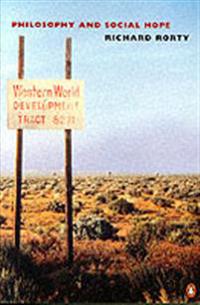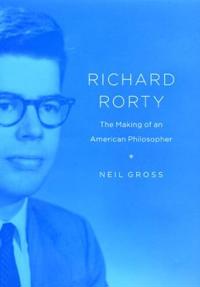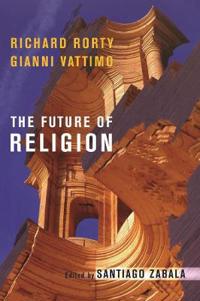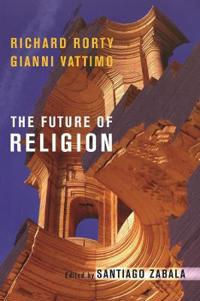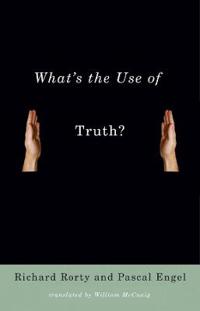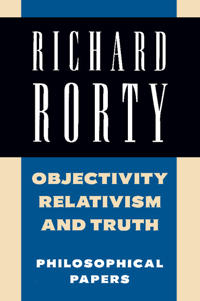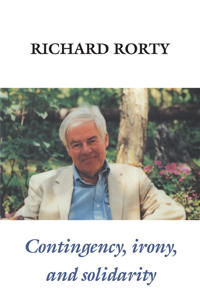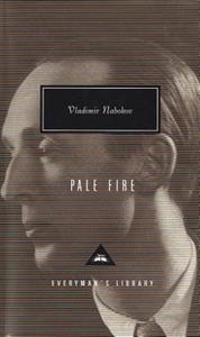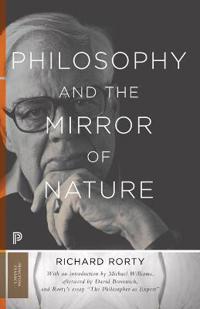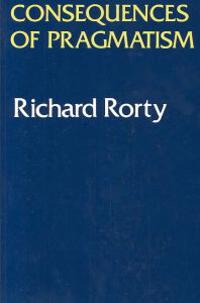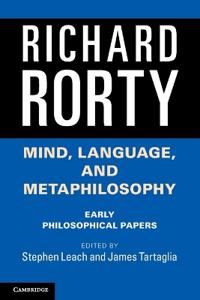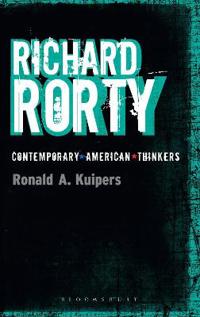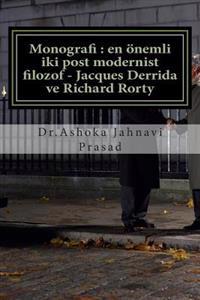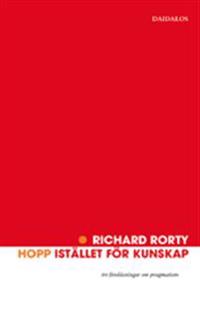Richard Rorty: Philosophical Papers Set (Häftad)
avRichard Rorty
ISBN: 9780521701525 - UTGIVEN: 2007-02This set of four volumes brings together seminal essays spanning the career of Richard Rorty, one of the most creative and influential anglophone philosophers of recent decades. The essays range widely over the concerns of philosophy, politics, science, religion, and culture, engaging with thinkers [...]
Philosophy and Social Hope (Storpocket)
avRichard Rorty
ISBN: 9780140262889 - UTGIVEN: 199908Richard Rorty is one of the most provocative figures in recent philosophical, literary and cultural debate. This collection brings together those of his writings aimed at a wider audience, many published in book form for the first time. In these eloquent essays, articles and lectures, Rorty gives a [...]
Richard Rorty (Inbunden)
avNeil Gross
ISBN: 9780226309903 - UTGIVEN: 200805On his death in 2007, Richard Rorty was heralded by the "New York Times" as "one of the world's most influential contemporary thinkers." Controversial on the left and the right for his critiques of objectivity and political radicalism, Rorty experienced a renown denied to all but a handful of living[...]
The Future of Religion (Inbunden)
avRichard Rorty, Gianni Vattimo
ISBN: 9780231134941 - UTGIVEN: 200501Though coming from different and distinct intellectual traditions, Richard Rorty and Gianni Vattimo are united in their criticism of the metaphysical tradition. The challenges they put forward extend beyond philosophy and entail a reconsideration of the foundations of belief in God and the religious[...]
The Future of Religion (Häftad)
avRichard Rorty, Gianni Vattimo
ISBN: 9780231134958 - UTGIVEN: 200705Though coming from different and distinct intellectual traditions, Richard Rorty and Gianni Vattimo are united in their criticism of the metaphysical tradition. The challenges they put forward extend beyond philosophy and entail a reconsideration of the foundations of belief in God and the religious[...]
What's the Use of Truth? (Inbunden)
avRichard Rorty, Pascal Engel
ISBN: 9780231140140 - UTGIVEN: 200701What is truth? What value should we see in or attribute to it? The war over the meaning and utility of truth is at the center of contemporary philosophical debate, and its arguments have rocked the foundations of philosophical practice. In this book, the American pragmatist Richard Rorty and the Fre[...]
Ethics for Today, An: Finding Common Ground Between Philosophy and Religion (Övrig)
avRichard Rorty
ISBN: 9780231150569 - UTGIVEN: 2010-10-08Richard Rorty is famous, maybe even infamous, for his philosophical nonchalance. His groundbreaking work not only rejects all theories of truth but also dismisses modern epistemology and its preoccupation with knowledge and representation. At the same time, the celebrated pragmatist believed there c[...]
Objectivity, Relativism, and Truth (Häftad)
avRichard Rorty
ISBN: 9780521358774 - UTGIVEN: 199011Richard Rortyâs collected papers, written during the 1980s and now published in two volumes, take up some of the issues which divide Anglo-Saxon analytic philosophers and contemporary French and German philosophers and offer something of a compromise - agreeing with the latter in their criticis[...]
Contingency, Irony and Solidarity (Pocket)
avRichard Rorty
ISBN: 9780521367813 - UTGIVEN: 198902In this book Rorty argues that thinkers such as Nietzsche, Freud, and Wittgenstein have enabled societies to see themselves as historical contingencies, rather than as expressions of underlying, ahistorical human nature or as realizations of suprahistorical goals. This ironic perspective on the huma[...]
Richard Rorty
ISBN: 9780521804899 - UTGIVEN: 2003-08Richard Rorty has transformed the way many inside and outside philosophy think about the discipline.
Pale Fire (Inbunden)
avVladimir Nabokov, Richard Rorty
ISBN: 9780679410775 - UTGIVEN: 199203The urbane authority that Vladimir Nabokov brought to every word he ever wrote, and the ironic amusement he cultivated in response to being uprooted and politically exiled twice in his life, never found fuller expression than in "Pale Fire" published in 1962 after the critical and popular success of[...]
Philosophy and the Mirror of Nature (Häftad)
avRichard Rorty
ISBN: 9780691141329 - UTGIVEN: 200812When it first appeared in 1979, "Philosophy and the Mirror of Nature" hit the philosophical world like a bombshell. In it, Richard Rorty argued that, beginning in the seventeenth century, philosophers developed an unhealthy obsession with the notion of representation: comparing the mind to a mirror [...]
Richard Rorty (häftad)
ISBN: 9780739114995 - UTGIVEN: 2008-06Michael Bacon gives a critical presentation of Rorty's writings on pragmatism and political theory, comparing and contrasting him with pragmatists such as Hilary Putnam and Susan Haack and liberals such as John Rawls and Brian Barry. The result is an imaginative presentation of one of contemporary p[...]
Richard Rorty (Häftad)
avNeil Gascoigne
ISBN: 9780745633411 - UTGIVEN: 200812Neil Gascoigne provides the first comprehensive introduction Richard Rorty's work.
Mind, Language, and Metaphilosophy (Pocket)
avRichard Rorty, Stephen (EDT) Leach, James (EDT) Tartaglia
ISBN: 9781107612297 - UTGIVEN: 2014-04This volume presents a selection of the philosophical essays which Richard Rorty wrote during the first decade of his career, and complements four previous volumes of his papers published by Cambridge University Press. In this long neglected body of work, which many leading philosophers still consid[...]
The Rorty Reader (Inbunden)
avEditor:christopher J. Voparil, Editor:richard J Bernstein
ISBN: 9781405198318 - UTGIVEN: 2010-08-31The Rorty Reader (Häftad)
avEditor:christopher J. Voparil, Editor:richard J Bernstein
ISBN: 9781405198325 - UTGIVEN: 2010-08-31Richard Rorty (Häftad)
avRonald Alexander Kuipers
ISBN: 9781441182388 - UTGIVEN: 201301Richard Rorty is one of the most oft-cited yet least understood philosophers of the twentieth century. This book offers an overview and introduction to Rorty's ideas, key writings and contributions to the various fields of philosophy. Chronologically organized, the book traces the development of Ror[...]
Monografi: En Onemli Iki Post Modernist Filozof - Jacques Derrida Ve Richard Rorty (Häftad)
avDr Ashoka Jahnavi Prasad
ISBN: 9781499302684 - UTGIVEN: 2014-04Der Spiegel der Natur: Eine Kritik der Philosophie (Pocket)
avRichard Rorty
ISBN: 9783518282861 - UTGIVEN: 200807Hopp i stället för kunskap : tre föreläsningar om pragmatism (Häftad)
avRichard Rorty
ISBN: 9789171731920 - UTGIVEN: 200301Richard Rorty är en av samtidens mest omdiskuterade filosofer. I denna lilla bok, bestående av tre föreläsningar, ger han en tillgänglig och elegant presentation av sin version av pragmatismen.
Ur författarens förord:
Titeln »Hopp i stället för kunskap» är ett sätt[...]Striden om sanningen (Häftad)
avKarl-Otto Apel, Albrecht Wellmer, Jurgen Habermas, Richard Rorty
ISBN: 9789171732064 - UTGIVEN: 200410Från de gamla grekerna till idag har filosofer ihärdigt diskuterat hur begreppet »sanning» skall förstås. Denna antologi består av bidrag till en pågående debatt med fokus på förhållandet mellan sanning och rättfärdigande. Bidragsgivare är Richard Rorty, Jürgen Habermas, Albrecht Wel[...]


